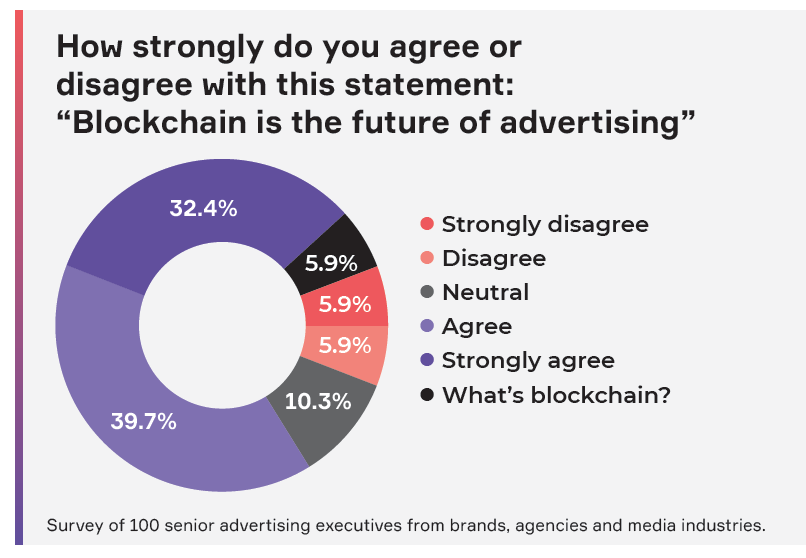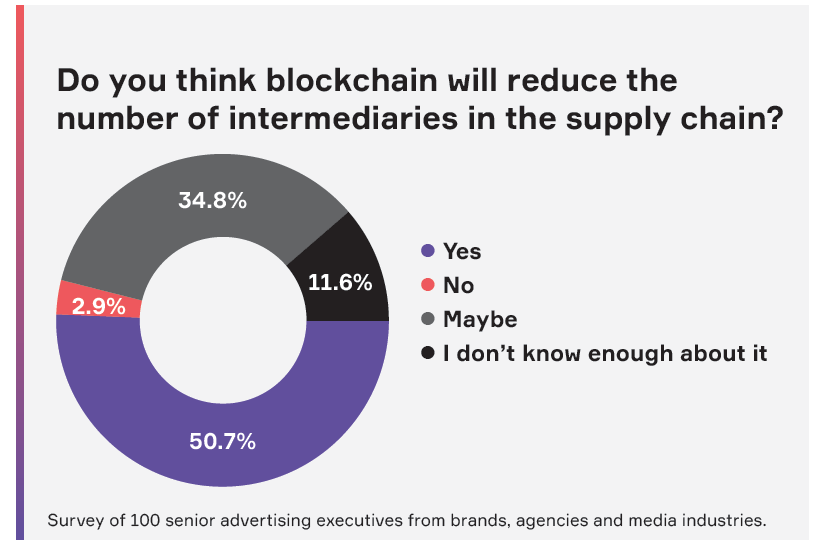
Blockchain Poised To Clean Up In Advertising Industry
The majority of surveyed advertising executives consider the future of the industry to be tied to blockchain technology.
Blockchain technology might be able to save the ailing advertising industry, according to a recent study. The report, jointly published by Adledger and TV[R]EV, found that the majority of advertising executives consider the future of the advertising industry to be tied to digital ledger technology.
In a survey of nearly 100 senior advertising executives, more than 70% of respondents “Agree” or “Strongly Agree” with the statement, “Blockchain is the future of advertising.” Less than 12 percent showed some level of disagreement, and 10.3 percent responded with “What’s blockchain?”
Advertising “In Crisis”
The study is intended to address what publishers describe as a “crisis” of the advertising industry. “Publisher profits are siphoned away by a complex middle layer in the name of greater efficiency,” the report says. “[R]oughly 70% of every ad dollar they spend disappears into the digital abyss.”
The authors found that many of the problems in digital advertising stem from either intentional fraud or threats to user privacy. Unsavory clients can easily resort to automated bot programs to improve their viewership numbers with fake clicks, or use domain spoofing to defraud advertisers.
More ominously, the advertising “duopoly” – Google and Facebook – now account for a quarter of all advertising sales, amassing enormous volumes of user data.
Digital ledgers could reduce some of those inefficiencies by de-intermediating the market for advertisements, the study suggests. At present, an ad buy passes through several sets of middlemen between publisher and consumer, with the publisher’s share sometimes reduced to as little as 30%.
“Given the length and complexity of this supply chain,” the study finds, “it is extraordinarily difficult for a marketer to know precisely how many times their ad changed hands or even exactly which companies were involved in a specific programmatic buy.”
In contrast, even a low-level application of DLT could streamline the ad-buying process. Using a transparent, shared ledger reduces the need for intermediary parties, and a survey of industry insiders found that over half responded positively to the question, “Do you think blockchain will reduce the number of intermediaries in the supply chain?”
A Better Experience for Consumers?
While streamlining the legacy advertising market might be described as a “minimalist” position, the study also outlines a bolder possibility: a new advertising model that improves the experience for consumers as well.
Described as “Extreme Blockchain,” the report introduces efforts “to bring consumers into the transaction and make them aware of the value of their personal data to publishers and advertisers.” Although the report does not name names, it alludes to several efforts to bring consumers into the equation through blockchain based browsers or compensating consumers for ad interactions.
That’s moving closer all the time, as evidenced by recent excitement created by companies such as Basic Attention Token, which is integrated into the Brave internet browser and Lucidity, which is creating a platform for data transparency.
Crypto Briefing has previously reported on major innovations that could create value both for consumers and advertisers, without having to resort to the zero-sum game that many consider the current model represents.
In the meantime, the analysts predict that “blockchain technology will begin to see wider adoption in the next two to three years.”
The author is invested in digital assets.


